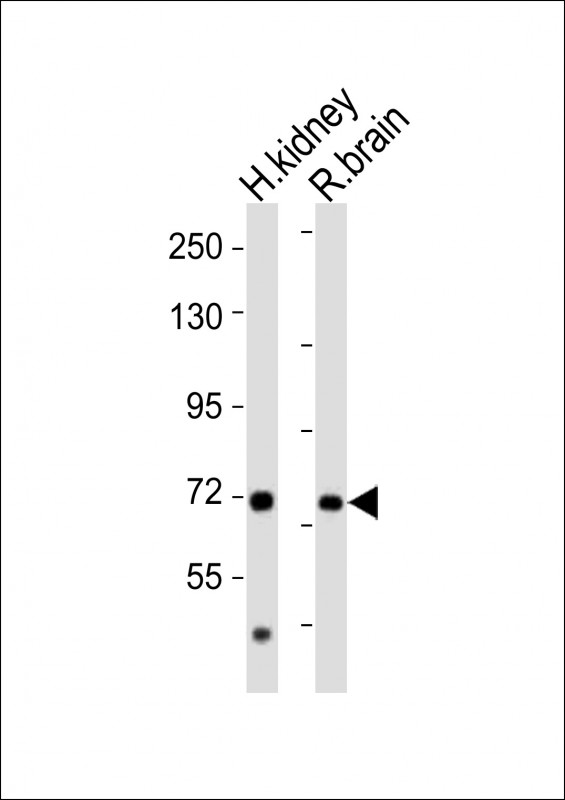
| WB | 1/2000 | Human,Mouse,Rat |
| IF | 咨询技术 | Human,Mouse,Rat |
| IHC | 咨询技术 | Human,Mouse,Rat |
| ICC | 技术咨询 | Human,Mouse,Rat |
| FCM | 咨询技术 | Human,Mouse,Rat |
| Elisa | 咨询技术 | Human,Mouse,Rat |
| Aliases | Acetoacetyl-CoA synthetase, Acyl-CoA synthetase family member 1, Protein sur-5 homolog, AACS, ACSF1 |
| Entrez GeneID | 65985 |
| WB Predicted band size | 75.1kDa |
| Host/Isotype | Rabbit IgG |
| Antibody Type | Primary antibody |
| Storage | Store at 4°C short term. Aliquot and store at -20°C long term. Avoid freeze/thaw cycles. |
| Species Reactivity | Human, Mouse, Rat |
| Immunogen | This AACS antibody is generated from a rabbit immunized with a KLH conjugated synthetic peptide between 539-573 amino acids from the C-terminal region of human AACS. |
+ +
以下是关于AACS(Acetoacetyl-CoA synthetase)抗体的3篇参考文献示例(注:文献信息为示例性概括,具体内容建议通过学术数据库核实):
---
1. **文献名称**: *"Role of AACS in adipocyte differentiation and lipid metabolism"*
**作者**: Kang S, et al.
**摘要**: 该研究首次报道了AACS在脂肪细胞分化中的关键作用,通过构建特异性抗体检测其在3T3-L1前脂肪细胞分化过程中的表达变化,证实AACS通过调控乙酰乙酸-CoA合成促进脂质累积。
---
2. **文献名称**: *"AACS contributes to tumor progression via fatty acid synthesis in colorectal cancer"*
**作者**: Kim J, Lee H.
**摘要**: 研究利用AACS抗体进行免疫组化和Western blot分析,发现AACS在结直肠癌组织中高表达,并通过激活脂肪酸合成通路促进肿瘤生长,提示其作为潜在治疗靶点。
---
3. **文献名称**: *"Development of a monoclonal antibody against human AACS for metabolic disorder studies"*
**作者**: Ohashi M, Ouchi N.
**摘要**: 文章描述了一种针对人源AACS的单克隆抗体的开发与验证,该抗体成功应用于ELISA和免疫荧光实验,揭示了AACS在肥胖小鼠肝脏组织中的异常表达与代谢紊乱的关联。
---
如需具体文献,建议通过PubMed或Google Scholar检索关键词“AACS antibody”或“Acetoacetyl-CoA synthetase”获取最新研究。
AACS (acetyl-CoA synthetase) antibodies are tools used to study the enzyme responsible for catalyzing the formation of acetyl-CoA from acetate, CoA, and ATP. This reaction is critical in cellular metabolism, linking carbohydrate and lipid pathways by providing acetyl-CoA for the tricarboxylic acid (TCA) cycle, fatty acid synthesis, and histone acetylation. AACS is expressed in various tissues, with elevated activity observed in metabolic tissues like the liver and adipose tissue. Dysregulation of AACS has been implicated in metabolic disorders, cancer, and neurological diseases, as altered acetyl-CoA levels impact energy homeostasis, epigenetic regulation, and cell proliferation.
Researchers employ AACS antibodies in techniques such as Western blotting, immunohistochemistry, and immunofluorescence to detect protein expression, localization, and abundance in biological samples. These antibodies aid in exploring AACS roles in diseases; for example, upregulated AACS in certain cancers correlates with enhanced lipogenesis and tumor growth. Commercially available antibodies are typically validated for specificity using knockout controls or siRNA silencing. Recent studies also investigate AACS as a potential therapeutic target, particularly in metabolic syndrome and oncology. However, challenges remain in distinguishing AACS isoforms and ensuring cross-reactivity across species. Overall, AACS antibodies are vital for advancing understanding of metabolic regulation and disease mechanisms linked to acetyl-CoA dynamics.
×